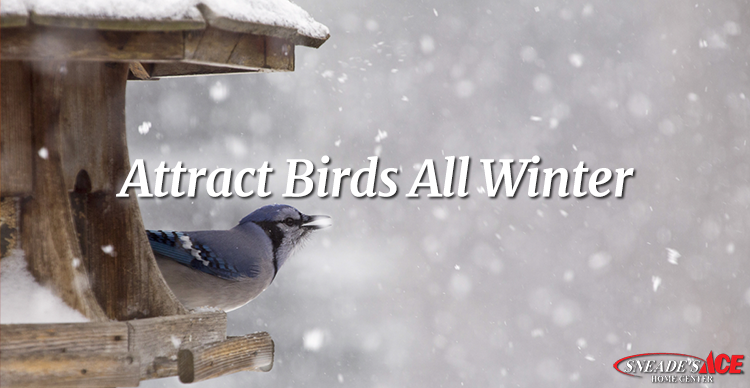Help Birds Survive the Winter
Winters in the Chesapeake region are unpredictable for certain. Heavy wind and rain, sleet and snow, coupled with fluctuating temperatures create challenging outdoor living situations, especially for non-migratory birds. While birds are very well equipped to survive on their own, studies have shown that birds with access to bird feeders and birdhouses survive at a higher rate. Additionally, ornithologists have suggested that amateur bird-watching and feeding is a beneficial hobby for humans as well. Here are some tips to help birds survive the winter.
Ensure Seed is Accessible and Dry
If the food in the feeder becomes soggy and wet, it will sprout or even become moldy. This could make birds sick. Choose hopper and tube feeders to protect seed from wet weather. Make sure you sweep snow off of platform feeders. You can even clear a space on the ground and scatter seeds for ground-feeding species like sparrows, towhees, juncos, and doves.
Use Extra Feeders During Bad Weather
Consider keeping an extra-large capacity feeder on hand for blustery weather. It offers another place for the birds to eat, plus more birds can feed at once. Further, it cuts down on trips outside to fill the feeder. Also, consider putting out different types of feeders such as peanut feeders, suet feeders, satellite feeders and a hopper feeder.
Scatter Seeds in Secluded Areas
Not all birds like to eat out of bird feeders. Some species prefer to linger in thickets, brambles and other secure and secluded spaces. Scatter seed like black oil sunflower, sunflower bits, peanut bits and mixed seed along the edge of wooded areas, under bushes, hedges, and decks.
Offer High-Energy Foods
Many birds thrive on foods like suet, meat scraps and peanut butter. The fat provides an initial energy boost and lasting nutrition for long winter nights. For curious minds: suet is the fat removed from processed beef. You can purchase suet feeders, or even make one at home!
Reconsider Bird Bath Heaters
Having a birdbath in your yard is beneficial for birds in that if offers water for drinking and bathing. But, birds will bath instinctual in open water in even the coldest weather. This can be dangerous in that if the water is warm, and the air is frigid, the water may freeze on their feathers. You can place large rocks in the bird bath to discourage bathing but encourage drinking. Once the last freeze passes, you can remove the rocks.
Offer Mealworms in a Heavy Dish
When the ground is frozen birds do not have access to live worms and grubs. Place a heavy dish out on your porch or deck railing or stoop with live or dried mealworms. If you do it at the same time every day, the birds will also get in the habit of visiting every day for this special treat.
Make Birdhouses Warm and Cozy
During times of rain and snow or extreme cold birds may not have access to dried grass or other items to nest in the birdhouse you provided. Considers placing wood shavings or clean, dry meadow grass in the bottom of the house. It will help to keep birds cozy and warm. However, avoid using sawdust because if it gets wet, it retains moisture, therefore defeating the whole purpose of the bedding.
Creating a safe and abundant backyard area for feeding and caring for birds throughout the winter is a fun activity for the whole family. Even a few of these tips for helping birds survive the winter could make a big difference. We love taking care of our feathered friends all year long. If you have any questions how you can get started in amateur birding, or simply how you can feed the birds in your area ask the friendly knowledgeable staff at Sneade’s Ace Home Center. We have a variety of seeds, birdhouses and feeders from which you to choose. Tips for helping birds survive the winter…another reason why Sneade’s Ace Home Center is the place.

